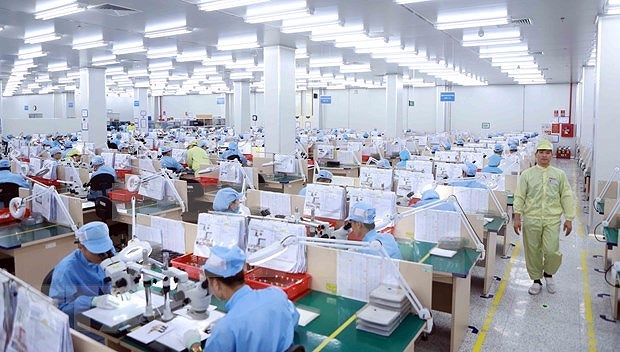In recent years, many investors from developed countries have gradually turned to Vietnam, with 2021 continuing to be a promising year in attracting foreign direct investment (FDI).
Hanoi (VNA) - In recent years, many investors from developed countries have gradually turned to Vietnam, with 2021 continuing to be a promising year in attracting foreign direct investment (FDI).
Taking advantage of new free trade agreements that Vietnam has signed, the number of FDI projects is expected to rise, directly and strongly affecting the Vietnamese labour market.
Positive changes
After more than 30 years of integrating with the world economy and making strong efforts to reform institutions and business environment, Vietnam has been emerging as an attractive destination for foreign investors. This has directly had a strong impact on the Vietnamese labour market.
In 2021, it is forecast that FDI inflows into Vietnam will continue to rise and create positive changes to the labour market.
International Labor Organisation Vietnam labour economist Valentina Barcucci said that an analysis of the Vietnamese today labour market shows that its labour market reflects economic restructuring.
According to Barcucci, in 2000, nearly two-thirds of the labour force (65.3%) had jobs in the agricultural sector. Twenty years later, the proportion has dropped to about one-third (37.2%). A third of that decline in agriculture has been allocated to the service and industrial sectors.
According to Minister of Labour, Invalids and Social Affairs Dao Ngoc Dung, foreign investment inflows in recent years have had a significant impact on the development of the market and the productivity and income of workers.
In particular, the number of direct and indirect jobs has increased significantly. The number of employees working in foreign-invested enterprises has increased from 330,000 in 1995 to about 6.1 million workers in 2019. The labour growth rate of the FDI sector has averaged 7.72% per year, much higher than the labour growth of the whole economy and other economic sectors.
By the end of December 2020, the total foreign investment capital into Vietnam reached 28.5 billion USD. This number has decreased by 25% compared to 2019 due to the negative impact of the COVID-19 pandemic on the global economy.
However, as Vietnam has effectively controlled the epidemic, foreign investors are continuing to make new investments or increase investment capital in Vietnam.
According to a survey by Navigos Search, Japanese manufacturers in the field of electronic components and automobiles are planning to expand market in Vietnam in 2021. In addition, manufactures from Europe, the US, China and Japan are exploring the market to build factories and develop production and business activities in Vietnam.
In 2021, information technology businesses have demand for thousands of IT engineers to serve their development plans. According to Ngo Thi Ngoc Lan, Regional Director at Navigos Search, the demand for personnel in the fields of information technology, digital banking, financial technology (fintech), e-commerce will gradually recover as this is a market with sustainable development.
At the same time, the life insurance sector has a high demand for recruiting senior positions or financial advisors. The sector is expected to grow by 15%.
Trends in recruiting high-quality personnel
The shift in labour structure from low-skilled labor-intensive industries to higher-quality labor-intensive industries was accelerated by new FDI projects.
In the early period of attracting foreign investment, laboures often sought jobs in the industries requiring a large number of workers such as textiles and garments, leather and footwear.
However, workers have now focused on the industries using high technology. The proportion of employees in the electronics and electronic products industry has increased continuously in recent years.
Labour productivity also has a positive change thanks to the capital of the foreign-invested sector. Labour productivity of FDI enterprises is 3-5 times higher than the general labour productivity of the whole country.
 In 2021, businesses tend to focus on high-quality personnel with the most up-to-date technologies. (Illustrative photo: VNA)
In 2021, businesses tend to focus on high-quality personnel with the most up-to-date technologies. (Illustrative photo: VNA)In that context, workers, especially those who are old, untrained, with low skills, will certainly face many difficulties to adapt to the new environment.
Without careful preparation, a large part of workers in Vietnam may face the risk of job loss, unemployment and abandonment in the trend of job displacement./.